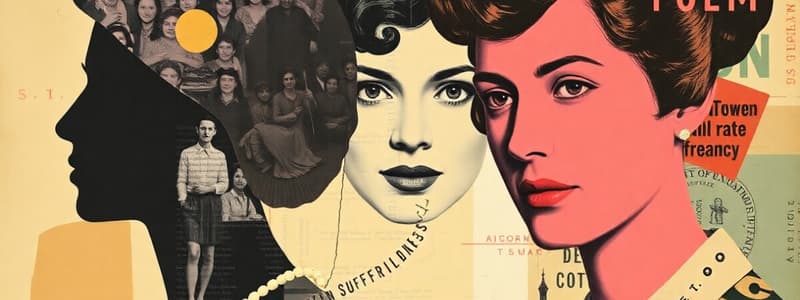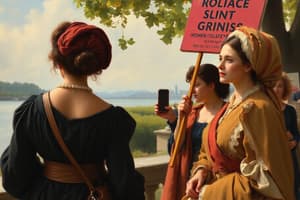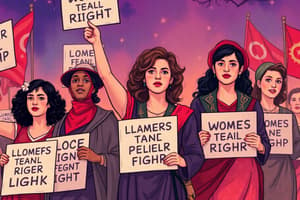Podcast
Questions and Answers
What was the significance of Matilda Joslyn Gage's statement, 'The soul must assert its own supremacy or die,' in the context of the women's rights movement?
What was the significance of Matilda Joslyn Gage's statement, 'The soul must assert its own supremacy or die,' in the context of the women's rights movement?
- It advocated for the expansion of women's voting rights alone
- It argued for the complete separation of church and state to achieve gender equality.
- It encouraged women to prioritize spiritual enlightenment over political activism.
- It served as a call to action for future generations of women to assert their rights and autonomy. (correct)
What distinguishes Isabella Beecher Hooker's contribution to the women's rights movement from that of other activists mentioned?
What distinguishes Isabella Beecher Hooker's contribution to the women's rights movement from that of other activists mentioned?
- Her work primarily focused on advocating for temperance and prohibition.
- She fought for women's rights to own property within her state. (correct)
- She was the sole publisher.
- She completely disavowed black activists.
Given the historical context, what is the most likely reason The Provincial Freeman specifically targeted the Black community?
Given the historical context, what is the most likely reason The Provincial Freeman specifically targeted the Black community?
- To encourage people to avoid voting.
- To promote exclusively skilled jobs.
- To address the unique challenges faced by the Black community, particularly concerning fugitive slave laws and deportation. (correct)
- To encourage people to support slavery.
The motto of The National Citizen and Ballot Box was 'The Pen Is Mightier Than The Sword'. What did this imply about the strategy of the publication?
The motto of The National Citizen and Ballot Box was 'The Pen Is Mightier Than The Sword'. What did this imply about the strategy of the publication?
How did The North Star newspaper broaden the scope of abolitionist discourse?
How did The North Star newspaper broaden the scope of abolitionist discourse?
Lucretia Coffin Mott's activism was rooted in a specific interpretation of her Quaker beliefs. Which of the following statements best captures the nuance of her position?
Lucretia Coffin Mott's activism was rooted in a specific interpretation of her Quaker beliefs. Which of the following statements best captures the nuance of her position?
Sojourner Truth's declaration, 'You may hiss as much as you please, but women will get their rights anyway,' can be analyzed for its rhetorical impact. Which of the following interpretations best explains its effectiveness in the context of her time?
Sojourner Truth's declaration, 'You may hiss as much as you please, but women will get their rights anyway,' can be analyzed for its rhetorical impact. Which of the following interpretations best explains its effectiveness in the context of her time?
Abby Kelly Foster invoked the sacrifices of women who came before, stating, 'Bloody feet, sisters, have worn smooth the path by which you come hither.' What is the most likely purpose of this quote?
Abby Kelly Foster invoked the sacrifices of women who came before, stating, 'Bloody feet, sisters, have worn smooth the path by which you come hither.' What is the most likely purpose of this quote?
Elizabeth Cady Stanton's phrase, 'The right is ours, have it we must, use it, we will,' encapsulates the spirit of the women's suffrage movement. Which of the following options best describes the underlying philosophy conveyed in this statement?
Elizabeth Cady Stanton's phrase, 'The right is ours, have it we must, use it, we will,' encapsulates the spirit of the women's suffrage movement. Which of the following options best describes the underlying philosophy conveyed in this statement?
Lucy Stone's advocacy, reflected in her statement 'Leave women, then, to find their sphere,' challenged societal norms. What core belief underpinned her fight for women's rights?
Lucy Stone's advocacy, reflected in her statement 'Leave women, then, to find their sphere,' challenged societal norms. What core belief underpinned her fight for women's rights?
Julia Howard Howe urged people to 'Make your protest against tyranny, meanness, and injustice.' How did she view the vote in relation to overcoming societal inequity?
Julia Howard Howe urged people to 'Make your protest against tyranny, meanness, and injustice.' How did she view the vote in relation to overcoming societal inequity?
Suppose a contemporary activist, inspired by Lucretia Coffin Mott, organizes a protest against a government policy they deem unjust. Which action would most closely align with Mott's philosophy?
Suppose a contemporary activist, inspired by Lucretia Coffin Mott, organizes a protest against a government policy they deem unjust. Which action would most closely align with Mott's philosophy?
If Lucy Stone were to debate a modern-day commentator who claims that women are naturally better suited for domestic roles, which of the following arguments would Stone most likely employ?
If Lucy Stone were to debate a modern-day commentator who claims that women are naturally better suited for domestic roles, which of the following arguments would Stone most likely employ?
Flashcards
The North Star
The North Star
An anti-slavery newspaper advocating for rights and freedoms.
The Revolution
The Revolution
A women’s rights and suffrage magazine co-edited by Susan B. Anthony.
Mary Ann Shedd Cary
Mary Ann Shedd Cary
An activist who believed in the importance of leadership roles for Black women.
Constitution's 'People'
Constitution's 'People'
Signup and view all the flashcards
'The Pen Is Mightier Than The Sword'
'The Pen Is Mightier Than The Sword'
Signup and view all the flashcards
Matilda Joslyn Gage
Matilda Joslyn Gage
Signup and view all the flashcards
Fugitive Slave Act
Fugitive Slave Act
Signup and view all the flashcards
Social Conditions of the Black Community
Social Conditions of the Black Community
Signup and view all the flashcards
Lucretia Coffin Mott
Lucretia Coffin Mott
Signup and view all the flashcards
Sojourner Truth
Sojourner Truth
Signup and view all the flashcards
Abby Kelly Foster
Abby Kelly Foster
Signup and view all the flashcards
Elizabeth Cady Stanton
Elizabeth Cady Stanton
Signup and view all the flashcards
Lucy Stone
Lucy Stone
Signup and view all the flashcards
Julia Ward Howe
Julia Ward Howe
Signup and view all the flashcards
Women’s Suffrage Movement
Women’s Suffrage Movement
Signup and view all the flashcards
Abolition Movement
Abolition Movement
Signup and view all the flashcards
Study Notes
Suffragist Activism and Movements
- Civil Rights Battles: Battles for civil rights were not viewed as wars, but rather as a continuation of existing beliefs; engagement in these battles didn't necessarily oppose Quakerism but rather emphasized the need for action.
- Abolitionist and Suffrage Connections: Several suffragists were also active in the abolitionist movement.
- Audience Reaction: Audiences sometimes reacted negatively to speeches, with heckling and opposition common.
- Influential Suffragists and Their Arguments: Different suffragists presented diverse arguments for women's rights, including the right to vote, the right to own property, and broader societal roles.
- Means to Gain Rights: Some suffragists advocated for women to have a choice in social spheres, while others saw voting as the necessary first step to societal equality.
- Publications Supporting Suffrage: Publications such as The Woman's Journal played a crucial part in the movement, and other supporting publications existed that also involved temperance and abolitionist viewpoints.
- Focus on "Home Protection": Some suffragists framed suffrage not merely as a right, but as a practical means to protect homes and families.
- Motivations and Tactics: Women argued for their rights and freedoms by protesting, acting, and writing. These actions aimed to advance women's rights and equality within society.
- Women's Property Rights: Some suffragists advocated for the right of women to own property.
- Black Communities and Suffrage: Women were also fighting for the rights of other marginalized groups, including Black communities and formerly enslaved people.
- Temperance and Equality: Connections between suffrage movements and temperance societies, and the impact these movements had.
- Publications and Newspaper Roles: Some publications actively supported suffragist movements.
- Focus on the Next Generation: Leaders emphasized the importance of the next generation of women continuing the fight.
Specific Suffragists and Their Contributions
- Lucretia Coffin Mott: Advocated for women's rights, rejecting passive approaches.
- Sojourner Truth: Her words and actions brought attention to women's rights and activism.
- Abby Kelly Foster: Emphasized the bravery of earlier women suffragists.
- Elizabeth Cady Stanton: Advocated for women's rights, stressing the importance activism and agency.
- Lucy Stone: Fought for women's right to choose their roles in society, actively supporting women seeking their rightful places in society.
- Julia Howard Howe: Spoke against injustices against women, highlighting the need for equality.
- Susan Brownell Anthony: Protested for the right's of women, highlighting that women's rights were essential.
- Isabella Beecher Hooker: Advocated for women's citizenship rights.
- Mary Ann Shadd Cary: Addressed the role of women in society and their voices. (Questionable topic)
- Matilda Joslyn Gage: Promoted the importance of women continuing the fight for rights.
- Frances Willard: Viewed the fight for suffrage as essential for protecting homes and family.
Studying That Suits You
Use AI to generate personalized quizzes and flashcards to suit your learning preferences.




